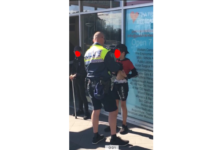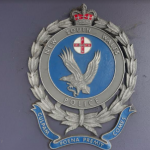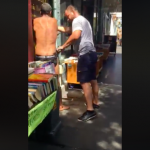NSW Police Partially Strip Search 13-Year-Old Boy in Public

Sniff Off posted an image on its Facebook page last Tuesday that shows a NSW police officer partially strip searching a 13-year-old boy on the side of the road in broad daylight. The officer appears to be lifting up the child’s shirt, revealing his torso to any passersby in the close vicinity in Blacktown.
The tireless campaign against the warrantless use of drug detection dogs in public places, Sniff Off stated in the post that the image was taken from footage of the incident it had received. And the group further commented that it can’t publish the full clip as it would reveal the boy’s identity.
The Sniff Off page admin reports that the group has received “legal advice that what happened was indeed a strip search, because a general search should only involve full/partial removal of outer clothing, not a shirt, which would expose skin, as occurred in this case”.
And this is just the latest development in the ongoing NSW strip search saga, which involves a police procedure that’s supposed to be of last resort, not only having become routine, but entailing so little oversight or guidance that its commonplace to overstep the bounds of what’s lawful.
Blatant disregard
“Anybody who sees the footage would be disturbed by it,” said NSW Greens MLC David Shoebridge. “A child of 13 years of age, being partially stripped in public by police. On the face of it, it’s a gross infringement of not just his dignity, but this child’s legal rights as well.”
“There is a prohibition on doing a strip search in a public place, unless it is both urgent and necessary,” he continued. “There’s nothing to suggest that the officer even turned his mind to that question, before partially removing the shirt of this child in public.”
The Greens justice spokesperson obtained figures last December that revealed over the four years prior, NSW police upped its use of strip searches by 47 percent: in 2014-15, 3,735 were carried out, while in 2017-18, there were 5,483. And 64 percent of these searches turned up no illegal items.
In conjunction with the NSW Young Greens, Shoebridge runs the Sniff Off campaign. Separate figures the group has sourced show that in 2018 police carried out strip searches 11 percent of the time following a positive drug dog indication, which compares with just 3 percent of instances in 2011.
“The fact that police are so willing to flout the law when it comes to the rights of children,” Shoebridge added in relation to the Blacktown incident, “makes you realise how much work there is to do to reform police strip search powers in NSW.”
“Seriousness and urgency”
“There is no other law in NSW that allows a grown man to legally ask a child as young as 13 years of age to remove clothing or pull up their top, so they can view their body,” stressed Samantha Lee, head of Redfern Legal Centre’s (RLC) police and government accountability practice.
“This practice is antiquated and fails to adhere to child protection principles,” the solicitor told Sydney Criminal Lawyers. “It just needs to stop.”
NSW police strip search powers are set out in the Law Enforcement (Powers and Responsibilities) Act 2002 (NSW), also known as the LEPRA. As Ms Lee explained a “strip search is any search that goes beyond a general search” as set out in section 30 of the legislation.
So, “anything that requires a person to remove or lift up outer clothing into the inner layer or bare body should be viewed as a strip search”. And in these circumstances, according to Ms Lee, some basic safeguards then apply, including it being done in a private area out of the view of onlookers.
Section 32 of the LEPRA requires an officer informs the subject of why the search is necessary and ask for their cooperation. Privacy must be considered, and the search must be conducted as quickly as possible. While the officer conducting the search must be of the same sex as the subject of it.
And there are unique provisions that apply to youths between 10 and 18 years of age. Subsection 33(3) stipulates a parent, guardian or capable representative must be present, although subsection 33(3A) states that this provision doesn’t apply if a delay in a search threatens safety or evidence.
Non-existent or vague if there
The NSW coronial inquiry into drug-related deaths at festivals heard evidence relating to strip searches. One involved a NSW police officer threatening to draw out the procedure in order to intimidate a young woman into revealing the whereabouts of her non-existent drugs.
On one of the final hearing days, counsel assisting the coroner Peggy Dwyer said the court was yet to receive the police protocols relating to strip searches. And she added that these rules should be made available to the general public. However, the RLC warns that this may not be possible.
“Police have yet to confirm if any standard operating procedures exist to guide the application of police strip searches,” Ms Lee said. “Without the assurance that clear and rigorous safeguards exist to govern the use of strip searches, we risk a breakdown in trust between the public and police.”
The RLC launched the Safe and Sound campaign last December. It’s currently undertaking research into strip search legislation both here and in other jurisdictions, with a view to changing what Lee has described as the “vague and legalistic” provisions already contained in the LEPRA.
“No-one wants to see a person forced to undergo an unlawful strip search because police officers have wrongly applied the law,” Ms Lee made clear. “It’s a lose-lose situation.”
“Deeply entrenched” in police culture
Mr Shoebridge’s office has carried out a search through police operating and training manuals and found nothing pertaining to strip searches. The Greens MLC underscored that there’s also nothing to show that any consideration has been given to the humiliation and trauma caused by the procedure.
The recent Blacktown incident shows that despite the public backlash against the rising use of this invasive practice, officers continue to be obviously unaware of whether they’re breaking strip search laws, or they’re simply disregarding them.
“The lack of oversight, the lack of rules and the ignorance of the law is being played out daily on the streets of NSW,” Mr Shoebridge concluded. “And the people who are most often the victims are young people, Aboriginal people, people of colour and marginal people in our community.”







